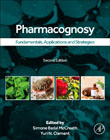
Pharmacognosy: Fundamentals, Applications and Strategies
Badal McCreath, Simone
Clement, Yuri N.
Pharmacognosy: Fundamentals, Applications and Strategies, Second Edition represents a comprehensive compilation of the philosophical, scientific, and technological aspects of contemporary pharmacognosy. It examines the impact of the advanced techniques of pharmacognosy on improving the quality, safety, and effectiveness of traditional medicines, and how pharmacokinetics and pharmacodynamics have a crucial role to play in discerning the relationships of active metabolites to bioavailability and function at the active sites, as well as the metabolism of plant constituents. Structured in seven parts, the book covers the foundational aspects of Pharmacognosy, the chemistry of plant metabolites, their effects, other sources of metabolites, crude drugs from animals, basic animal anatomy and physiology, technological applications and biotechnology, and the current trends in research. New to this edition is a chapter on plant metabolites and SARS-Cov-2, extensive updates on existing chapters and the development of a Laboratory Guide to support instructors execute practical activities on the laboratory setting. Students of Pharmacognosy will find the structured and comprehensive approach of Pharmacognosy: Fundamentals, Applications and Strategies, Second Edition particularly helpful to connect theory and practice. Instructors will benefit from well-planned laboratory activities. Covers the main sources of natural bioactive substances Contains practice questions and laboratory exercises at the end of every chapter to test learning and retention Describes how pharmacokinetics and pharmacodynamics play a crucial role in discerning the relationships of active metabolites to bioavailability and function at the active sites Includes a dedicated chapter on the effect of plant metabolites on SARS-CoV-2 INDICE: Part I - Pharmacognosy 101 1. Background to Pharmacognosy 2. Traditional Medicine 3. Plant Anatomy and Physiology 4. Plant Constituents: Carbohydrates, Oils, Resins, Balsams, and Plant Hormones 5. Plant Crude Drugs Part II - Plant Metabolites: Their Chemistry 6. Evolutionary Perspectives on the Role of Plant Secondary Metabolites 7. Glycosides 8. Alkaloids 9. Tannins 10. Terpenoids 11. Other Plant Metabolites 12. Vitamins Part III - Plant Metabolites: Their Effects 13. Chemotherapeutics 14. Bioactive Plant Molecules, Sources and Mechanism of Action in the Treatment of Cardiovascular Disease 15. Plant Metabolites and More Treating Various Ailments: Natural Products Treating Diseases 16. Psychoactive Drugs 17. Plant metabolites and SARS-Cov-2 Part IV Metabolites from Other Sources 18. Marine Metabolites: Oceans of Opportunity 19. Animal Metabolites: From Amphibians, Reptiles, Aves/Birds, and Invertebrates 20. Fungal Metabolites Part V - Crude Drugs From Animals 21. Fats 22. Waxes Part VI - Basic Animal Anatomy and Physiology 23. Form and Function of the Animal Cell 24. Proteins 25. Pharmacokinetics 26. Pharmacodynamics-A Pharmacognosy Perspective 27. Drug Metabolism Part VII - Technological Applications Using Biological Systems 28. Biotechnology Part VIII - Current Trends in Pharmacognosy Research 29. Natural Product Structure Elucidation by NMR Spectroscopy 30. Metabolomics Approach in Pharmacognosy 31. Novel Targets in Drug Discovery 32. Nanotechnology: Building and Observing at the Nanometer Scale 33. Ethical Aspects of Working With Local Communities and Their Biological Resources 34. Factors to Consider in Development of Nutraceutical and Dietary Supplements 35. The Global Regulatory Framework for Medicinal Plants 36. The Potential Role of Bioscience Industries in Small Developing Economies
- ISBN: 978-0-443-18657-8
- Editorial: Academic Press
- Encuadernacion: Rústica
- Páginas: 738
- Fecha Publicación: 01/06/2023
- Nº Volúmenes: 1
- Idioma: Inglés
